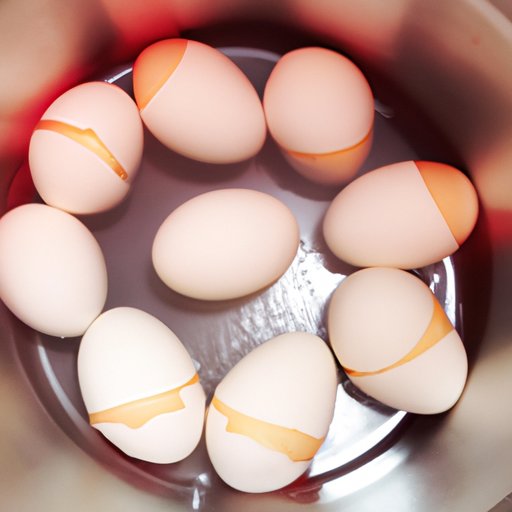
How Long Do You Boil Eggs? A Comprehensive Guide to Cooking Perfect Eggs
Boiling eggs might seem like a simple task, but it can be challenging to get them just right. Overcooking can lead to a rubbery texture, while undercooking can leave the egg runny and unappetizing. In this article, we’ll provide a comprehensive guide to boiling eggs successfully every time.
Step-by-Step Guide
Before diving into the specifics of boiling eggs, let’s review the basic process. To boil eggs, you’ll need:
- A pot
- Water
- Eggs
Here are the steps to follow:
- Place eggs in a single layer in a pot.
- Cover eggs with an inch of cold water.
- Bring water to a boil.
- Once water is boiling, remove the pot from heat, and cover it.
- Wait according to the type of egg you’re cooking.
- Once time is up, remove the eggs from the hot water, and put them in cold water.
- Let the eggs cool down for at least 5 minutes before peeling them.
It’s essential to remember that different types of eggs can require varying amounts of time to cook correctly.
Types of Eggs and Boiling Time
There are three primary types of eggs: small, medium, and large. Large eggs are standard for recipes and, therefore, the most common. Here are the suggested times for cooking boiled eggs according to their size:
- Soft-boiled: Small eggs (4 minutes), medium eggs (5 minutes), large eggs (6 minutes)
- Medium-boiled: Small eggs (6.5 minutes), medium eggs (8 minutes), large eggs (9 minutes)
- Hard-boiled: Small eggs (10.5 minutes), medium eggs (12 minutes), large eggs (13 minutes)
To ensure that eggs cook evenly and prevent the yolk from being overcooked, place eggs in boiling water at the start of the cooking time.
Cooking Eggs to Perfection
Whether you prefer your eggs soft, medium, or hard, there are few tips that ensure eggs come out perfect each time.
- Use room temperature eggs.
- Starting with cold water helps prevent cracking.
- Once you put the eggs into the pot, turn the heat down slightly. It’ll prevent the water from bubbling too vigorously.
- Once cooked, it’s essential to remove them immediately from the hot water so the yolk isn’t overcooked.
Best Uses for Boiled Eggs
Boiled eggs are an affordable, healthy, and versatile ingredient that can be the basis of countless dishes. They are the perfect ingredient for salads, sandwiches, and an on-the-go snack. Here are few recipe ideas:
- Egg salad sandwich – finely chopped boiled eggs mixed with mayonnaise and served on bread with lettuce and tomato.
- Cobb salad – chopped boiled eggs served with bacon, avocado, grilled chicken, and romaine lettuce.
- Nicoise salad – add boiled eggs, green beans, tomatoes, and potatoes for a fresh and colorful dish.
The Science of Boiling Eggs
The boiling process causes several chemical changes in the egg, leading to the hard center and rubbery whites. The proper temperature and cooking time required to boil an egg depends on the chemical reaction taking place inside the egg when it is exposed to heat.
Heat transforms the protein structure of an egg, leading to the denaturation- unfolding- of the proteins and their eventual reaction, resulting in solidifying of the egg. The boiling of an egg thus depends on the time taken to reach that critical temperature.
Time-Saving Tips
Boiled eggs are a practical addition to any meal or snack. Here are few tips for quick and efficient boiling of eggs:
- Boiling water in a kettle helps to reach the boiling point quicker.
- Use a slotted spoon to remove the eggs from the water.
- Cool them under running tap water to save time.
Personal Experiences
Everyone develops their own methods for boiling eggs. Some methods may work better than others, depending on you. Here are some personal tips:
- Add a teaspoon of vinegar to the water to prevent the egg from leaking if it cracks during cooking.
- Pierce the blunt end of the egg with a thumbtack before boiling to avoid cracking.
- Store boiled eggs in a sealed container in the refrigerator for up to one week.
Conclusion
Boiling eggs might seem daunting, but with this comprehensive guide, you’re now ready to cook the perfect boiled egg. Remember to use the tips provided here, experiment, and have fun. Boiled eggs are a healthy and a delicious addition to any meal.





